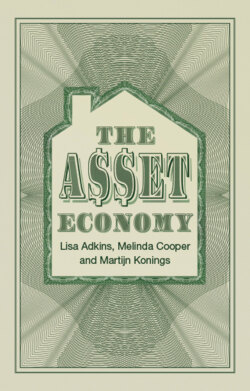Читать книгу The Asset Economy - Lisa Adkins - Страница 5
Preface
ОглавлениеThe collaboration that led to the writing of this book emerged out of the convergence of ideas from our individual work. Each of our recent books (Adkins’ The Time of Money, Cooper’s Family Values and Konings’ Capital and Time) emphasized the growing role that speculative, asset-centred economic logics play in contemporary society. In this book we aim to build on that work to develop a new way of thinking about class and inequality.
We are very grateful for the generous institutional support that this project has received from the Faculty of Arts and Social Sciences at the University of Sydney, in particular its FutureFix programme ‘Asset Ownership and the New Inequality’.
In what follows, we make frequent reference to the 2007–8 financial crisis. Since that event, the inequalities associated with asset-based wealth have become more entrenched. As this book goes to press, the world is experiencing a very different kind of emergency – the Covid-19 pandemic. In numerous countries, death rates are soaring, governments have put in place stay-at-home and social distancing mandates, and millions have lost their jobs as businesses are shutting down. The crisis has also done much to draw attention to existing levels of inequality. While the wealthy are able to take refuge in holiday homes, many workers living paycheck to paycheck cannot afford to ‘socially isolate’. Somewhere in between is a middle class that, mostly able to ride out the storm by staying inside, may be counting its blessings but is at the same time increasingly aware of how precarious its security – financial and otherwise – really is.
Central banks have stepped up their asset purchase programmes, pushing the scale and scope of ‘quantitative easing’ to new levels. The $2 trillion relief package which Trump approved at the end of March 2020, even as he was still playing down the public health aspect of the pandemic, works largely according to the logic of trickle-down economics, offering financial help to embattled firms in the hope that this will induce them to maintain employment. Other countries, including the UK and Canada, have guaranteed wages directly. Such moves have fuelled hopes for a more enduring revival of Keynesianism or even for a radical programme of progressive economic policy. But even though crises can widen the horizon of political possibility, we should not forget how in the aftermath of the 2007–8 crisis, the hoped-for return to Keynesianism was quickly transformed into virulent austerity politics.
The political stakes will be even higher this time. If the post-Covid-19 era sees another wave of asset inflation, and if home ownership remains the only real – but less and less realistic – way for ordinary people to participate in that logic, the next decade will see a continuation of the social and political polarization that has been such a defining feature of the past decade.
